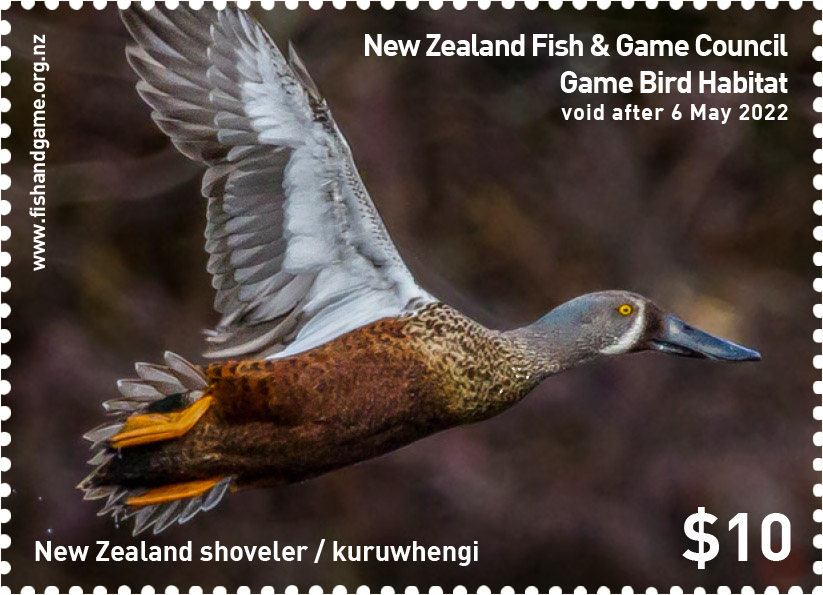The Game Bird Habitat Stamp Programme is designed to raise funds from the sale of an annual Game Bird Habitat Stamp and its related products for the protection and enhancement of game bird or other wildlife habitat.
 Set up under the New Zealand Game Bird Habitat Stamp Regulations 1993, the programme is run as a project within the annual business plan of the New Zealand Fish and Game Council (NZ Council) and staff time for administering the programme is recorded against the project.
Set up under the New Zealand Game Bird Habitat Stamp Regulations 1993, the programme is run as a project within the annual business plan of the New Zealand Fish and Game Council (NZ Council) and staff time for administering the programme is recorded against the project.
All expenditure and income is processed through the NZ Council’s accounts.
The Wildlife Act 1953 (section 19A) requires a game bird habitat stamp be affixed to every licence to hunt or kill game.
The stamp is approved annually by the Minister of Conservation on the recommendation of the NZ Council made after having regard to the views expressed by Fish and Game Councils and the New Zealand Game Bird Habitat Trust Board.
The habitat stamp is pre-fixed to all game licences.
Up until 1999 $1 of the game licence fee was paid to the programme.
Since 1999 $2 of the game licence fee was paid to the programme.
In 2017 $3 of the game licence fee was paid to the programme.
In 2019 this became $4 of the game licence fee for the programme. The current value of $5.00 on each licence was set for the 2023 game season.
The stamp has a face value of $10 (the amount paid by stamp collectors).
A First Day cover featuring the stamp is also produced each year as part of New Zealand Post’s annual Fish & Game release.
The stamp artwork has also been used to produce a print, which is sold accompanied by two duck stamps.
The early artwork was not owned by Fish & Game New Zealand but rather the American firm that promoted the stamp programme in New Zealand based on a similar programme operating in the US.
Included with the early artwork were a range of different products such as prints with medallions and artist remarks.
Since 1999 the later stamp programme is now owned by the New Zealand Council with the current programme operated by New Zealand Post in line with its own wider stamp and print programme but not valid for postage.
In philately, this is known as a cinderella stamp - "virtually anything resembling a postage stamp, but not issued for postal purposes by a government postal administration”.
Production/marketing of the programme by NZ Post involves one series of 500 signed and numbered artist’s prints produced annually sold unframed, including stamps.
The First Day cover was extended in 2000 to include a miniature sheet of the entire artwork as an additional First Day cover option.
Within the annual accounts of the NZ Council, all programme expenses (via NZ Post and game licence sales) are netted against the income received from sales, and the resulting net profit of the programme is transferred to the Game Bird Habitat Trust Board.
Since its inception proceeds from the stamp programme has raised over a million dollars for the protection and enhancement of game bird or other wildlife habitat.
Click on the following link to view the current and previous Game Bird Habitat Stamps.
The New Zealand Game Bird Habitat Trust Board
The New Zealand Game Bird Habitat Trust Board is a charitable body that was set up to receive and distribute the proceeds of the Game Bird Habitat Stamp program.
Each year the board invites any person or organisation to apply for funds from the trust for the protection, enhancement or creation of game bird habitat.
The New Zealand Council administers the program on behalf of the Trust Board.
The Trust is a registered charity and welcomes public donations.
For more information on the Trust Board and habitat enhancement please click here or contact your local Fish & Game office or the New Zealand Fish & Game Council.
Hunters supporting conservation
Game birds and native bird species are threatened by diminishing habitat such as wetlands, margins and scrublands.
New Zealand now has less than 10% of the wetland that was present in pre-European times.
Wetlands and margins have often been regarded as unproductive and have been converted into land for agricultural, commercial and housing development.
Purchases of the Habitat Stamp provide the core funds for the Game Bird Habitat Trust to distribute to deserving projects that protect and restore game bird habitats.